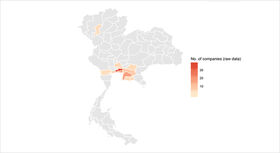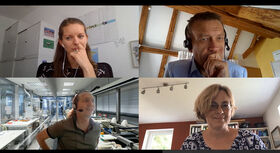Company survey paves the way to TVET offers for Thailand's electroplating industry
23.10.2020
During the development process of technical vocational education and training (TVET) programs in the field of electroplating, the essential characteristics and needs of the industry must be taken into account. This is the conclusion of German TVET experts from the SCHOOLPLATE project in light of the survey results of the Thai electroplating industry.
The SCHOOLPLATE project has been initiated in cooperation between the Federal Institute for Vocational Education and Training (BIBB) and the Fraunhofer Institute for Manufacturing Engineering and Automation (IPA) in January 2020 and aims to support the Thai electroplating industry in the development of demand-oriented TVET offers.
Now the data of the exploratory phase are available. In an online survey and interviews, companies in the Thai electroplating industry were asked about, among other things, companies’ organization of work and qualification requirements of their employees.
The results support the project in identifying suitable options for the design of initial and continuing TVET measures, taking the prevailing structures in the companies as well as in the Thai TVET system into consideration.
Small and medium-sized electroplating companies are part of a global value chain

The majority of the companies that took part in the online survey are located in the greater Bangkok area and neighboring provinces in Central and Eastern Thailand. Another focus is the area around Chiang Mai, the economic center in the north of the country.
Thai electroplating production is mainly contract manufacturing, which is carried out by small and medium-sized companies (SME). This is also reflected in the regional distribution of the companies, which are predominantly located in the "Eastern Economic Corridor (EEC)" industrial zone east of Bangkok. In recent years, the EEC has developed into Thailand's center for export-oriented industry – also including German companies - with the targeted support of the Thai government.
Major industries are the automotive and electronics sector, which are the main customers of the electroplating industry in Thailand. Other industries relevant to the electroplating industry are mechanical engineering and plant construction, sanitary, furniture, jewelry and aviation.
Female employees dominate on the shop floor
Two thirds of those specifically employed in the electroplating production sector are women. This remarkable characteristic in the employment structure can be partly explained by the fact that (laboratory) analysis and quality control are important areas of work in electroplating production, in which women – also in Germany - are predominantly employed.
Qualification deficits pose a challenge to competitiveness
The answers provide a detailed picture of the existing challenges in the electroplating industry, the causes of which are often to be found in a lack of skills and knowledge on part of the personnel. Furthermore, the Thai electroplating industry is under increasing pressure to improve quality and cost efficiency of its production due to external factors such as growing competition at home and abroad, rising wages, stricter legal requirements in the field of environmental protection and safety and last but not least due to the economic consequences of the COVID-19 pandemic.
Expert workshops provide vital support for the SCHOOLPLATE project in the processing of findings

During an online workshop on September 23, 2020, German TVET experts from the project advisory board discussed the results of the study and defined key characteristics for a professional qualification profile in the Thai electroplating industry. The German framework regulations for vocational education and training of surface coaters (“Oberflächenbeschichter”) served as guideline in the process. To date, there is no professional qualification offer in Thailand which could provide the necessary basics for a qualified job in the electroplating industry. However, due to differences in the educational sector as well as in the company work organization, the German qualification profile cannot be transferred to the Thai context.
In the implementation phase of the project, such a qualification profile will serve as a benchmark for the development of coordinated and tailored training modules for current employees as well as a vocational school curriculum. The development will take place in collaboration with TVET policy-makers in Thailand to ensure the alignment to national standards. The aim is to enable well-trained graduates to find qualified employment in the electroplating industry in the future.
What is next?
The results of the company survey and the German proposal for a tailored qualification profile will be presented to representatives of the Thai electroplating industry and TVET policy-makers for discussion and validation. Due to the COVID-19 pandemic, all events will be organized via video conferences.
The results of the exploratory phase will form the basis for a two-year implementation phase in which Fraunhofer IPA, in collaboration with BIBB and Thai partners from science, industry and politics, will develop and pilot tailor-made initial and continuing vocational education and training measures for the Thai electroplating industry from 2021 onwards.
A corresponding project proposal for funding by the Federal Ministry of Education and Research (BMBF) is currently in the tendering phase.